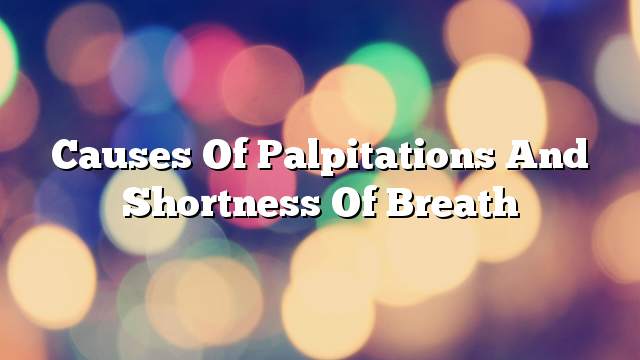Heart palpitations
Is the feeling that the heart beats very hard or very quickly, such as applause, so that it seems to exceed some of the pulses, may notice a person palpitations of the heart in the chest, throat, or neck, and can be this feeling troublesome or dangerous.
This condition is not usually serious or harmful. It simply appears due to stress, anxiety, or a large amount of stimulants such as caffeine, nicotine, or alcohol, and disappears on its own. Breathing difficulty is a broad term used to describe respiratory discomfort. This condition can gradually develop, and breathing may suddenly become more stressful. There are many things that can cause this distress, it may develop as a result of stress and anxiety, or it may be a sign of a serious health problem in need of medical attention.
Causes of heart palpitations
- Strong feelings such as anxiety, fear or tension, and palpitations often occur during panic attacks.
- Strong physical activity.
- Caffeine, nicotine and alcohol, or drugs that are sold illegally on the roads.
- Some medical problems, including thyroid disease, low blood sugar, anemia, low blood pressure, fever, and dehydration.
- Hormonal changes during menstruation, pregnancy or menopause, but sometimes palpitations during pregnancy may be signs of anemia.
- Medicines, including diet pills, and antacids.
- Some herbal and dietary supplements.
- Abnormal levels of electrical charges in the body.
Some people experience palpitations after eating heavy meals rich in carbohydrates, sugar, or fat, and sometimes eating some foods that contain high levels of monosodium glutamate or nitrates can be infected.
Causes of shortness of breath
Some simple and superficial causes of shortness of breath:
- Allergy to dust, mold, or pollen.
- Tension and anxiety.
- Clogged nose or throat with phlegm.
- Not getting enough oxygen due to high altitude climbing.
Other serious and serious causes of dyspnea include:
- Lung problems: such as chronic asthma, pneumonia, pulmonary embolism, and other problems.
- Cardiac problems: A person may experience shortness of breath if he has some heart problems such as coronary artery disease, congenital heart disease, or irregular heartbeat.
- Breathing difficulties in young children: Infants and young children often experience breathing difficulties when they suffer from respiratory viruses.
